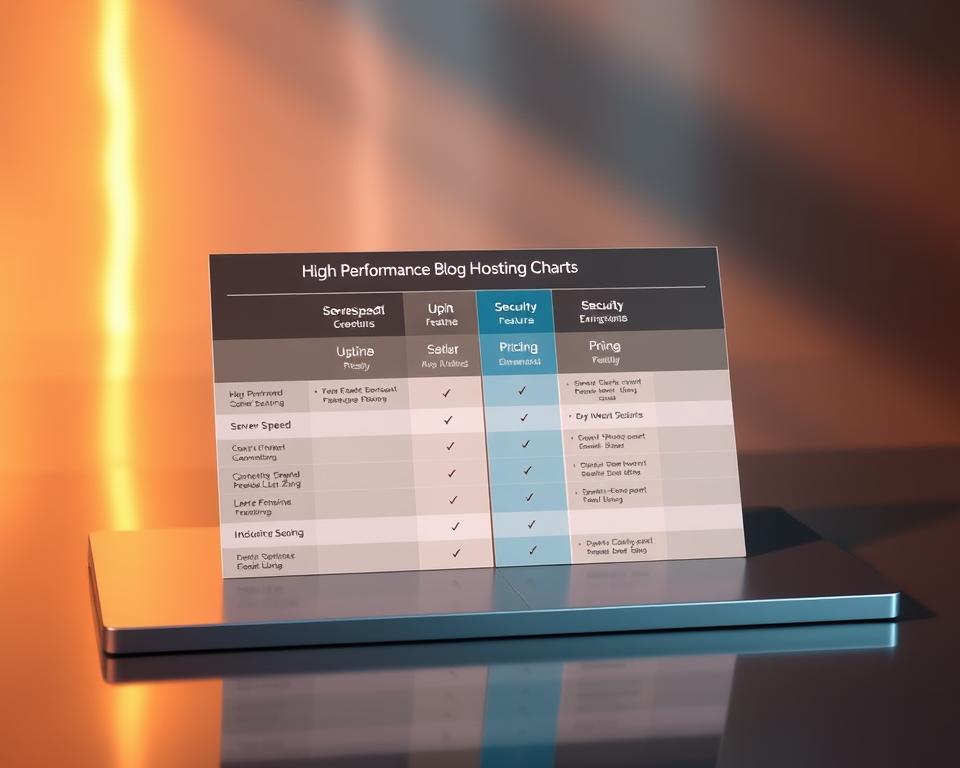There are over 600 million blogs online. But, picking the wrong hosting can slow your site down. The best hosting sites make your blog fast, keeping readers interested.
This guide helps you find a hosting service that’s fast, secure, and affordable. It’s key for new writers and growing brands. The right platform boosts your blog’s visibility and cuts down on tech issues.
Look at uptime guarantees, customer support, and how easy it is to grow your site. Top services like Bluehost and SiteGround are better than generic ones. Your blog’s success begins with the right hosting.
Understanding the Blog Hosting Landscape
Blog hosting is key for online content. It stores website files on servers you can reach over the internet. The right choice makes your blog fast, secure, and easy to use. Now, top blog hosting services offer great features at good prices, meeting today’s blogging needs.
What is Blog Hosting?
Blog hosting gives your blog a home online. It stores your posts, images, and code. Services handle server upkeep, keeping your site up and secure. Important factors include storage, bandwidth, and support.
Platforms like WordPress.com or Squarespace make things easier. They offer hosting with design tools, making setup simple.
The Evolution of Hosting Platforms
Hosting has changed a lot over the years. Early days used shared servers and basic HTML. Now, automation and cloud tech have changed the game. Here’s a look at the old and new ways:
| Past Hosting | Modern Hosting |
|---|---|
| Manual site updates | One-click updates |
| Limited customization | Drag-and-drop builders |
| Basic security measures | SSL certificates included |
Today’s top blog hosting services focus on growth. They use cloud tech to handle big traffic without trouble.
Exploring Best blog hosting sites for Your Blogging Journey
Choosing the right blog hosting site is key. It depends on your goals and budget. Many affordable blog hosting providers offer great solutions without high costs. Whether you’re starting a new blog or growing an old one, there’s something for everyone.
- Scalable plans for growth
- 24/7 customer support
- Customizable themes and plugins
Providers like Bluehost and SiteGround are both cheap and reliable. They often include free domain setup, SSL certificates, and easy-to-use interfaces. Beginners usually start with shared hosting, while more advanced bloggers might choose VPS or dedicated options.
“Finding an affordable host doesn’t mean compromising on security or speed. I’ve seen small blogs thrive with budget-friendly plans.”
It’s important to research and compare features to find the best fit for your blog. Start by making a list of what you need, like cost, storage, and customer service. Also, look at reviews and uptime guarantees to see if a provider is reliable. With many affordable blog hosting providers out there, every blogger can find a good partner to grow with.
Evaluating Top Blog Hosting Services
Choosing the best reliable blog hosting platforms means looking at key areas. Check uptime, support, and site speed to keep your blog running well. The top services aim to meet different blogging needs by balancing these aspects.
Begin by examining the basics that are crucial for success. Think about:
Identifying Key Features in Top Services
- Uptime: Make sure providers offer at least 99.9% uptime to reduce downtime.
- Support: Look for 24/7 chat/email support and detailed knowledge bases.
- Speed: Focus on CDNs and optimized servers for quicker page loads.
User Experience and Performance Ratings
Read third-party reviews and customer feedback. For example, a blogger said,
“HostGator’s uptime tracking and backup tools made maintenance effortless.”
Compare performance metrics like page load speeds and customer satisfaction scores. Reliable blog hosting platforms often score well in independent reviews like SiteUptime and Trustpilot. Use tools like GTmetrix to check your site’s performance before you decide.
Affordable Blog Hosting Providers: Budget Without Compromise
Finding the best website hosting for bloggers on a budget is possible. Many hosts offer affordable plans with key features for your blog’s growth. Look for clear pricing, options to scale, and reliable service.

- Unlimited storage and bandwidth
- Free domain or email hosting
- 24/7 customer support
- SSL certificates
| Provider | Price | Features | Uptime |
|---|---|---|---|
| Bluehost | $2.95/month | Free domain, WordPress-optimized plans | 99.9% |
| SiteGround | $4.99/month | SSD storage, automatic backups | 99.99% |
| Hostinger | $1.99/month | One-Click WordPress install | 99.8% |
Compare plans based on your traffic needs and growth potential. Many hosts offer discounts for yearly payments. Choose hosts with good user reviews and uptime guarantees to avoid issues.
Bloggers can save money without sacrificing quality. Pick packages that fit your current traffic and allow for growth. Look into customer support and uptime to ensure reliability over time.
Reliable Blog Hosting Platforms for Consistent Uptime
Every minute a blog is down hurts its visibility and trust. Reliable hosting companies focus on uptime to keep sites up 24/7. This boosts search rankings, lowers bounce rates, and builds trust with readers.
How Reliability Impacts Your Blog’s Success
Uptime affects how users feel about your site. If servers fail, visitors leave. Search engines also penalize sites with frequent outages.
Recommended blog hosting companies like SiteGround and DreamHost offer 99.9% uptime. Their data centers prevent downtime, keeping content discoverable and engaging.
Case Studies on Reliable Platforms
- SiteGround: Tech blogs using their servers saw 40% higher monthly traffic after eliminating downtime.
- Bluehost: A travel blog increased bookings by 25% after switching to their 24/7 uptime plans.
- Hostinger: E-commerce blogs reduced cart abandonment by 18% with their stable server network.
These platforms offer uptime SLAs (service level agreements) backed by real-world results. Bloggers using these services avoid technical issues. They can focus on creating content that grows their audience.
Best Website Hosting for Bloggers: Essential Features
Choosing the right top blog hosting solutions means looking at key features. These features help bloggers work better and be more creative. Important things like being easy to use, flexible, and reliable help bloggers manage and grow their sites.
| Feature | Why It Matters |
|---|---|
| User-Friendly Interface | Reduces learning curves for non-technical users. |
| Customization Tools | Enables unique branding through themes and plugins. |
| Customer Support | Guarantees prompt solutions for technical challenges. |
| CMS Compatibility | Ensures seamless integration with platforms like WordPress. |
Speed and security are also key. Look for providers with fast loading times and SSL certifications to protect your site. Also, choose plans that can grow with your audience. Bloggers should compare these factors across the top blog hosting solutions to meet their goals.
For example, a one-click WordPress install makes setup easy. And 24/7 support keeps blogs running smoothly. By focusing on these features, bloggers can find a platform that supports their creativity and technical needs.
Comparing Recommended Blog Hosting Companies
Choosing the right hosting provider is key. It’s all about reliability, performance, and customer support. By looking at the best blog hosting reviews, bloggers can find the perfect fit for their needs.
Expert Recommendations and Industry Reviews
Platforms like Bluehost, SiteGround, and HostGator are at the top. Bluehost is known for its WordPress focus and great prices. SiteGround is praised for its fast servers and 24/7 support. HostGator is great for growing sites and has a strong uptime record.
“In recent best blog hosting reviews, SiteGround’s server reliability and customer service set it apart from competitors.”
What Sets Companies Apart
What makes each company unique? It’s their technical skills, customer service, and value. Here’s a quick look at the leaders:
| Company | Key Features | Pricing | Support | Uptime |
|---|---|---|---|---|
| Bluehost | Free domain, WordPress integration | $2.95/month | Live chat, phone | 99.9% |
| SiteGround | SSD storage, backups | $3.95/month | 24/7 live chat | 99.99% |
| HostGator | Scalable plans, 99.9% uptime | $2.69/month | Email, ticket system | 99.9% |
These comparisons show how each provider meets different needs. Looking at the best blog hosting reviews helps find the right one for your goals.
High-Performance Blog Hosting Services: Speed and Security
Speed and security are key for blogs to keep readers engaged and data safe. High-performance hosting focuses on quick loading times and strong security. Slow sites lose visitors, and weak security puts data at risk. The right hosting service is crucial.
- Look for SSD storage for faster data access.
- Choose providers offering CDN integration to reduce load times.
- Ensure SSL certificates and regular security updates are included.
“Speed and security are the cornerstones of a successful blog.”

| Feature | SiteGround | Bluehost | HostGator |
|---|---|---|---|
| Loading Speed | 99.9% uptime | Fast servers | Optimized for speed |
| Security | Daily backups & malware scans | Free SSL certificates | Automated backups |
| Support | 24/7 expert support | Live chat & guides | Phone and email support |
Top providers like SiteGround and Bluehost offer automatic backups and DDoS protection. Always check reviews and uptime before choosing. Focus on these to keep your blog fast, secure, and reliable for visitors.
Secure Blog Hosting Options for Peace of Mind
Keeping your blog safe is crucial. Services like SiteGround or HostGator offer top-notch security. They use encryption and watch your site in real-time to stop hackers.
Understanding Security Protocols in Hosting
Top providers use many layers of protection. Some key features include:
- SSL certificates for safe data transfers
- Automated malware scans to find threats
- DDoS protection to block attacks
- Regular server backups to save your data
Best Practices for a Secure Blog Environment
Even with great hosting, bloggers need to act:
- Turn on two-factor authentication for accounts
- Update themes and plugins fast
- Use strong, unique passwords for admin access
- Check login activity logs every week
Combining these steps with trusted hosting makes your blog very secure. Regular checks and training your team also help a lot.
In-depth Best Blog Hosting Reviews and User Experiences
Choosing the right blog hosting service is more than just looking at features. Real experiences from users show what really works. Reviews point out the good and bad, helping bloggers steer clear of common issues.
“My site loaded faster after switching to SiteGround. Their 24/7 support made setup easy.” – Sarah, travel blogger
- Uptime reliability and speed
- Customer support responsiveness
- Scalability for growing traffic
WordPress.com users love its all-in-one design but say it limits advanced customization. Bluehost users like its easy-to-use interface, but some find email support slow during busy times. SiteGround is great for performance but needs technical skills for the best results.
It’s smart to compare reviews from both new and experienced bloggers. Beginners like platforms with easy tools, while more established sites might want customizable options. Always look for recent reviews to see if services have improved.
Bluehost Blog and Self-hosted WordPress: A Comparative Insight
Deciding between a Bluehost blog and a self-hosted WordPress site depends on your needs and goals. Both are great for bloggers but offer different levels of control, flexibility, and support.
Analyzing Bluehost Blog Performance
Bluehost blog makes starting easy with one-click WordPress installations. It handles updates and backups, keeping your site running well. Tests show it has 99.8% uptime, perfect for beginners.
It also offers free domain registration and email hosting. This makes setting up your site simpler.
Benefits of Self-hosted WordPress
Self-hosted WordPress gives you full control, allowing unlimited plugin use and custom server settings. You can tweak SEO, caching, and performance yourself. This requires some tech know-how but gives you complete creative freedom.
- Bluehost blog includes automated security updates and 24/7 customer support, making maintenance easier.
- Self-hosted wordpress needs manual plugin management but supports advanced features like multisite networks and custom server settings.
Bloggers looking for simplicity might choose Bluehost. Those wanting more control often pick self-hosted WordPress for its long-term growth potential.
Squarespace Blog and Minimalist Blog Design Trends
Minimalist design is key in today’s web design. Squarespace blogs use this trend to offer easy tools for clean layouts. Their templates focus on space, bold text, and easy navigation, matching today’s looks.
| Feature | Squarespace Capabilities |
|---|---|
| Customizable Templates | Over 100+ pre-designed themes optimized for minimalist layouts |
| Mobile Responsiveness | Automatic scaling for all devices without code adjustments |
| Image Handling | Advanced cropping tools and high-resolution display |
Users love Squarespace blogs for their simplicity. “The Bedford template turned my site into a visual storytelling tool,” says a designer. Squarespace’s drag-and-drop editor makes it easy to change things up without needing tech skills. This follows minimalist rules by keeping things simple for creators.
- Auto-optimization for search engines with clean code
- Stock photography library for consistent branding
- Custom domain integration for professional URLs
Blogs like Design Simplified and Modern Minimalist Living use Squarespace. They mix good looks with easy content sharing. Their simple designs make pages load fast, keeping visitors interested. Squarespace blogs focus on a few key things, making reading and sharing easier.
Navigating Blog Hosting: Tips and Tricks
Getting the most out of your blog hosting starts with making smart choices. Whether you’re WordPress start a blog or managing a site, these tips help keep things running smoothly. Choose features that match your goals, like traffic and content types.
Maximizing Your Hosting Investment
- Pick a plan based on current and future traffic demands.
- Upgrade storage or bandwidth before hitting limits.
- Automate backups to protect content and avoid data loss.
“Regular updates and performance audits are key to long-term success,” says tech advisor Maria Chen. “Check server response times and plugin compatibility monthly.”
Speed up your site with caching plugins and image compression tools. Enable SSL certificates for security and SEO boosts. For WordPress start a blog users, streamline workflows by:
- Installing security plugins like Wordfence.
- Optimizing media files before uploads.
- Using CDN services for faster global access.
Pair these steps with routine maintenance. Use tools like UptimeRobot to monitor uptime and adjust hosting plans as your audience grows. Small tweaks today prevent big issues tomorrow.
Conclusion
Choosing the right blog hosting service is key to a smooth-running site that meets your goals. Platforms like Bluehost and Squarespace offer solutions for different needs. They ensure your site is reliable and secure.
For a minimalist blog, simplicity is crucial. Squarespace’s design templates help create clean, focused layouts easily. This makes your blog look great without needing to know a lot about tech.
Look for hosting providers with great performance and the ability to grow. Whether you’re starting a new blog or growing an old one, compare important features. Think about storage, customer support, and cost.
First, decide what you need for your blog. Do you want flexibility for WordPress or a ready-to-use design? Try free trials, read reviews, and pick a provider that’s affordable yet reliable. Your blog’s success depends on a solid foundation that grows with you.
Start looking for options today. Build a site that meets your current and future needs. This will help your blog reach and engage with your audience effectively.











